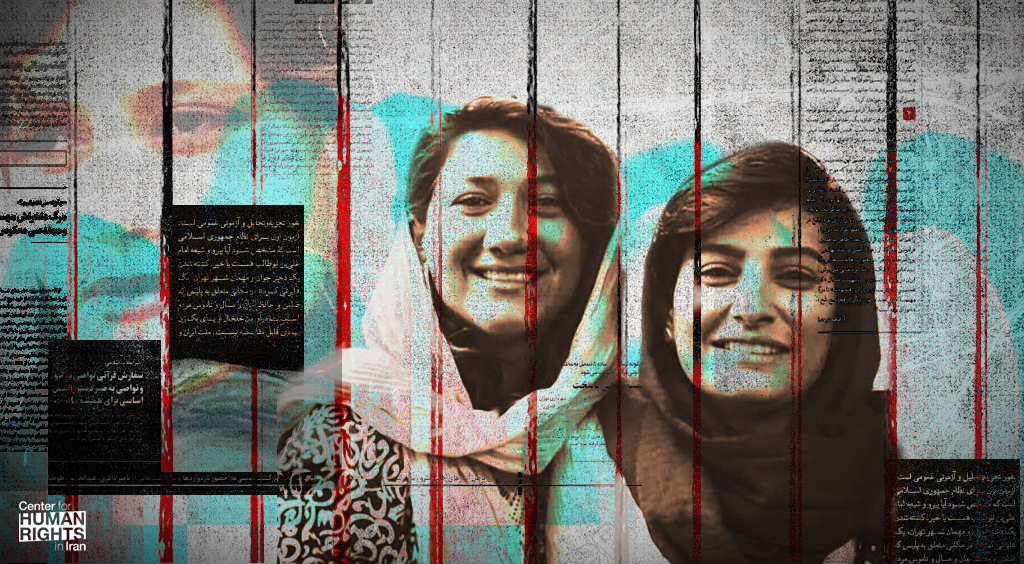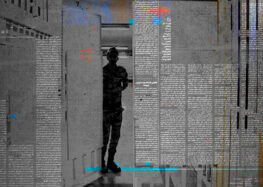Journalists Who Reported on Mahsa Jina Amini’s Killing Sentenced to Long Prison Terms

Niloufar Hamedi Gets 13 Years Behind Bars and Elahe Mohammadi 12 Years
Iranian Government Moves to Crush “Woman, Life, Freedom” Movement On All Fronts
October 23, 2023 — The sentencing of two women journalists in Iran, Niloufar Hamedi and Elahe Mohammadi, who have been detained in Iran for over a year, to long prison sentences for reporting on the death in state custody of Mahsa Jina Amini, underscores the use of the judiciary in Iran as nothing more than a tool of the state’s repressive apparatus, said the Center for Human Rights in Iran (CHRI).
Niloufar Hamedi, who works for the Shargh newspaper, has been sentenced to 13 years in prison (minimum of seven to be served), while Elahe Mohammadi, who works for the Hammihan newspaper, received a 12-year sentence (minimum of six years to be served).
The judiciary does the bidding of the state’s security apparatus, with complete disregard for the law, in support of the Islamic Republic’s relentless campaign against Iran’s “Woman, Life, Freedom” movement, CHRI added.
“One year after the killing of 22-year-old Mahsa Jina Amini in Iranian state custody over an allegedly inappropriate hijab, Iranian authorities are imprisoning journalists who covered her case and the lawyers who sought justice for her family, rather than holding the perpetrators accountable or abolishing the forced-hijab law, the root of ongoing violence against women in Iran,” said CHRI Executive Director Hadi Ghaemi.
“Hamedi and Mohammadi have committed no crimes other than being women and journalists in the Islamic Republic, both of which face relentless persecution,” he said.
“These brave women and all justice-seekers in Iran need unified international support; the global community must be willing to increase the political and economic isolation of this government as it continues to commit these abuses,” Ghaemi added.
CHRI urges all journalistic institutions as well as advocacy organizations for freedom of the press and freedom of speech to publicly and forcefully raise their voices in solidarity with these two women who have committed no wrongs: The power of their pens cannot and should not be silenced.
Journalists Imprisoned for Reporting Basic Facts
Elahe’s husband, Saeed Parsaee, tweeted on October 22, 2023: “After 400 days of your media propaganda, the only thing you proved was that you don’t have any evidence against Elaheh and Niloufar. May God give you strength. Now, please implement your own law and releasE Elaheh and Niloufar on bail according to Articles 242 and 244 of the Criminal Procedure Code until their appeal is decided.”
CHRI underscores that both journalists were detained for fulfilling their basic reporting duties: Hamedi shared a photo of Mahsa Jina Amini’s parents embracing in the hospital; Amini, a 22-year-old woman, was killed in Iranian state custody shortly after her arrest for an alleged inappropriate hijab. Meanwhile, Mohammadi traveled to Amini’s hometown of Saqqez to cover her funeral.
However, the initial rulings by the Islamic Revolutionary Court in Tehran were based on groundless charges of “cooperating with the U.S. enemy government,” “assembly and collusion against national security,” and “propaganda against the state.”
Amini’s death sparked months of nationwide protests known as the “Woman, Life, Freedom” movement, which were violently suppressed by state security forces.
To this day, journalists, activists, doctors, teachers, professors, lawyers, and family members of victims of state violence continue to be detained, arrested, or prosecuted on false charges for showing any form of acknowledgement or support of the movement.
CHRI stresses that just last week, Saleh Nikbakht, the lawyer for Amini’s family, was sentenced to a year in prison for speaking generally about the case with journalists.
Additionally, another young victim of the state’s brutality, Armita Geravand, 16, was declared brain dead on October 22, 2023, less than a month after she was reportedly assaulted by enforcers for Iran’s forced-hijab law in the Tehran metro.
“Until the Islamic Republic of Iran abolishes its draconian forced-hijab law, girls and women in Iran will remain at significant risk of severe or even lethal violence for merely exercising their right to freedom of expression and speech,” stated Ghaemi.
Widespread Condemnation of Sentences
The imprisonment of these journalists, who have been held in near-total isolation at Tehran’s Evin Prison since September 2022, has garnered widespread condemnation both within and outside Iran.
Behrooz Behzadi, editor-in-chief of Etemad newspaper, expressed hope that Judiciary Chief Gholam-Hossein Mohseni Ejei would reconsider the sentences. Behzadi stated, “A person who chooses to be in the media to serve the country cannot be labeled a traitor. This is the nature of media work, and people in the media discuss all the issues in society.”
UN Special Rapporteur on Human Rights Defenders, Mary Lawlor, demanded Iran stop persecuting human rights defenders: “Disturbed by Iran’s sentencing of journalists Elaheh Mohammadi & Niloufar Hamedi to 12 & 13 years, & lawyer Saleh Nikbakht to 1 yr, for their work on Mahsa Amini’s case, which sparked protests in 2022. Iran must stop the widespread persecution of HRDs [human rights defenders] and journalists.”
Meanwhile, the Journalists Trade Association in Tehran Province deemed the court’s decisions as “unacceptable” and expressed hope for the verdicts to be overturned on appeal.
The Iranian Writers Association also condemned the sentences, noting that they reveal the Islamic Republic of Iran’s strategy of suppressing freedom of expression.
In May 2023, Hamedi, Mohammadi, and Nobel Prize-winning prisoner of conscience in Iran, Narges Mohammadi, were all honored with the 2023 UNESCO/Guillermo Cano World Press Freedom Prize.
The two women were also awarded the 2023 Golden Pen of Freedom, the annual press freedom award of the World Association of News Publishers, a month later.
In the past 12 months, dozens of journalists have been arrested in Iran for reporting on the nationwide protests that followed the killing of Mahsa Jina Amini while she was in state custody.
During the protests, state security forces killed approximately 522 individuals. Furthermore, authorities arrested over 19,700 people in a brutal attempt to quell the dissent. Although the government has acknowledged detaining tens of thousands, it has refused to allow independent investigations to produce comprehensive statistics on casualties.
“The Islamic Republic of Iran has a long and well-documented history of punishing anyone who peacefully exposes its violence and brutality,” said Ghaemi.
“The ‘Woman, Life, Freedom’ movement emerged as a response to the ongoing injustices in Iran,” he added, “but the government has responded with even more violent repression, committing atrocities against protesters and others with impunity.”
This report was made possible from donations by readers like you. Help us continue our mission by making a tax-deductible donation.






